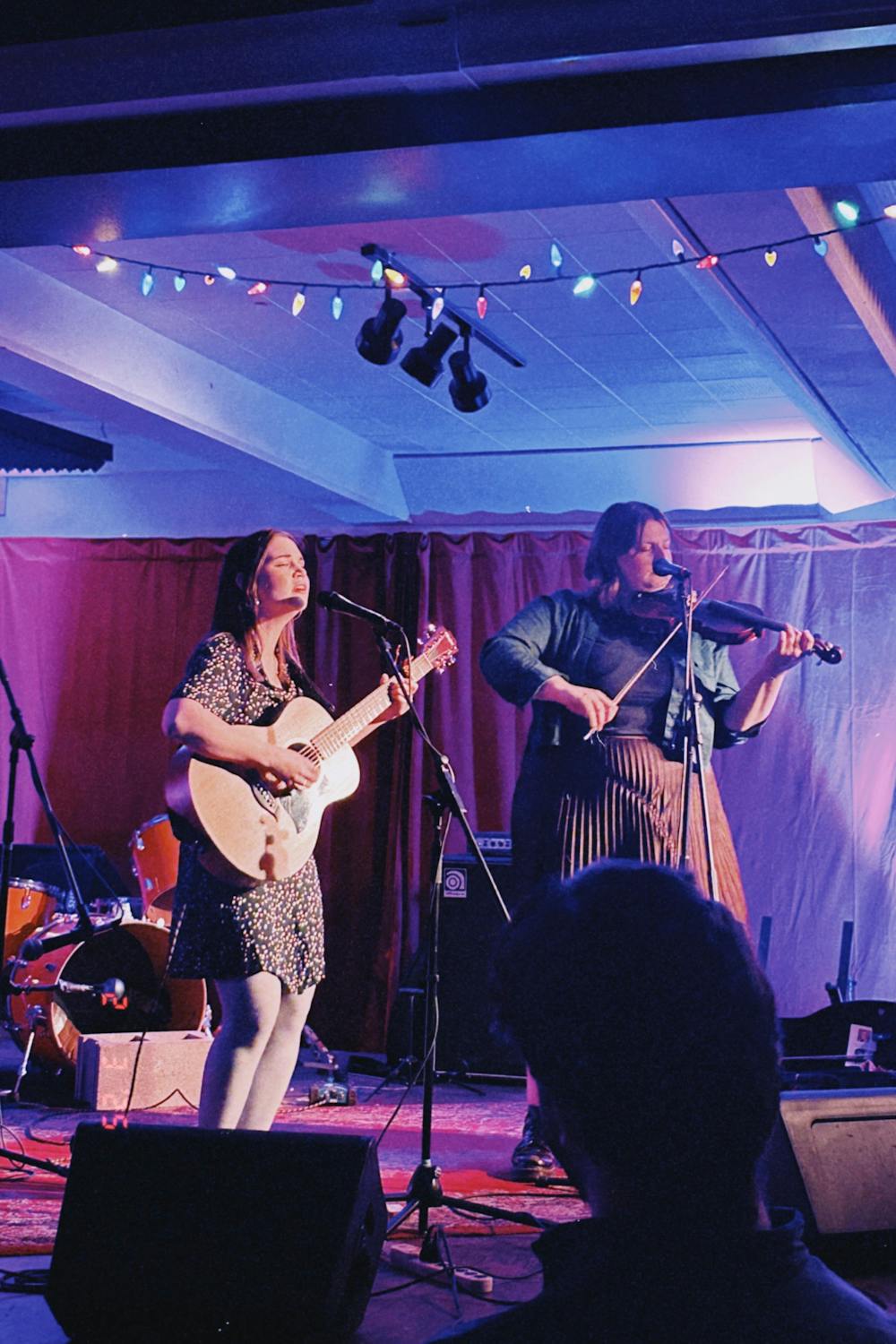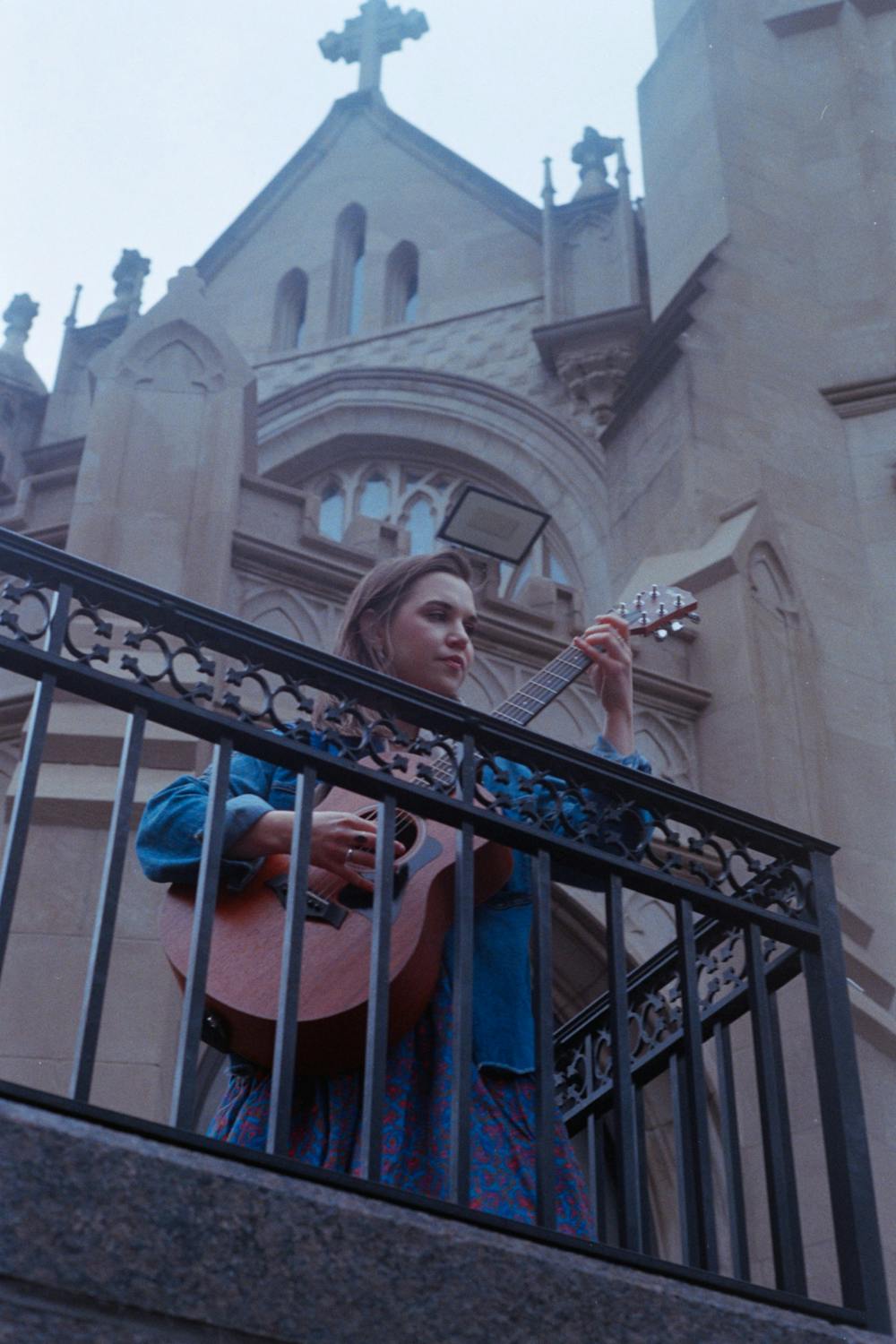I’ve been working on my interviewing skills for a while now. I often find myself faced
with the common ponderings of what questions I should ask, from which angle I should
approach the article, and how I should most accurately portray the artists I’m featuring. I’m a
student of interviewing, if you will, studying technique through practice. So when musician
Grace Leckey reached out to me about covering her return to Bloomington and her newest
releases, I jumped on the opportunity. In fact, she approached me as a learner herself – in her
own words: “I feel like, in a way, I’m only six years older than you but I’m kind of the same. I’m
doing the same kind of thing, trying to get better at life and my career and learning all the time.
So in many ways I feel like a student in this process as well.” Our conversation last week was a
communal experience rife with education and growth on both sides as we shared in discussing
the importance of art in, as Grace would say, “resisting facism.” (And yes, she told me to quote
that specifically). Because that’s the goal of IU alumnus Grace Leckey: To promote
accountability and equity in society through music and creativity. Because, as Grace insists, “We
are not powerless.”
Grace Leckey texted me back in December after she read some of my articles on WIUX’s
website (yay visibility!) asking if I would be interested in chatting about some of her upcoming
music and development as she traveled back to her college town of famed Bloomington, Indiana.
So, of course, we talked for nearly an hour about everything from her career, her much
anticipated single “Can’t Pray to Me,” her experimentation with production, her incredible
support system, and her hopes for the changes she can enact through artistry and education. Let’s
start from the beginning: Grace’s foundation at Indiana University. A student of audio
engineering at the Jacobs School of Music who graduated in 2022, Grace attributes much of her
success to Bloomington’s thriving music scene: “I think one of the testaments to how great that
program is is that the record I just recorded last summer at Power Station in New York City was
made by a room full of others that I met at the Jacobs school… The IU music network is so for
real.” Actually, back up – Grace’s real beginnings originate from her dad who taught her guitar
from the early age of 11, “which is the best way to learn how to play a musical instrument” as
Grace claims. Either way, Grace’s musical foundations are grounded in support and love,
development and maturation. Her pop-rock band here in Bloomington was called GraceKellie, an
important local group that “performed” at Culture Shock 2021 (aka live-streamed their set as the
event took place in the era of COVID-19).
After graduating from IU, Grace migrated to New York City where her family has its
roots, and became deeply involved with the artistic scene in Astoria, Queens. In fact, her
upcoming record is sponsored by the Queens Arts Fund, a grant from
the New York Foundation for the Arts. As an independent artist, Grace emphasizes
community and authenticity – qualities that are fostered with her job at Power Station, a
recording studio in New York’s Hell’s Kitchen neighborhood. When asked to describe her
personal music style, Grace talked about her recent resistance against the stereotypical title of
“singer-songwriter.” Grace explained that “sometimes I resist the singer-songwriter title because I think it can be a little bit confining. I think women especially get kind of swept into the singer-songwriter box and then don’t get as specific about what it is that they make, and I think we can branch out from that.” Instead, Grace chooses to focus on her
current aspirations that involve stretching into the “Americana roots” genre, exploring bluegrass
and folk themes. And it is through these genres that Grace has traversed in her newest ventures
including her upcoming single “Can’t Pray to Me (The Mary Song)” and the production of Jessie
Bittner’s single “Song for Janet,” both of which we focused on during our conversation.

Expanding on her exploration of production with “Song for Janet,” Grace and I discussed
the process and what the song has meant for her career. Throughout her experience as an
independent artist, Grace said that she’s dipped her toes in both the production and
presentation aspects of music creation: “I think I often find myself falling into this lull of helping
bridge this gap between artists and engineers, because I have my hand in both. Like I’ve said, I
studied audio engineering. And I find myself now in New York being that person that can kind of
help people connect the dots. And I do take a lot of pride in that and put a lot of love into that.”
So when her dear friend Jessie Bitner (whom she met through Jacobs, by the way) asked for
assistance with producing her first original and individual production, Grace pounced on the
opportunity. For context, Jessie Bitner is currently the Assistant Music Director and Violinist for
the national tour of Hadestown, which came to Bloomington last week! Aside from her
incredible achievements in the pit, Jessie has also helped Grace throughout her career – in fact,
Grace clarified that “Jessie is my fiddle player, and she’s on every track on this record,” referring
to her upcoming album Hell Gate coming out this summer. Consequently,
Grace offered her skills to Jessie’s adventure in song creation, performing guitar and background
vocals. Giving credit to all contributors, Grace also emphasized the invaluable work of her and
Jessie’s good friend Omisha Chaitanya, who tracked, engineered, and mastered the entire song.
It was the dream team, you could say.
Entering into the inspiration behind “Song for Janet,” Grace explained Jessie’s original
songwriting catalyst: “It’s dedicated to her violin teacher for many years. Her teacher (Janet
Sutter) passed away two or three years ago, so Jessie wrote this song dedicated to this person…
It’s really special to dedicate a song to music teachers. On one of the stops on my little journey
here, I came from New York to Washington D.C., and found out a music teacher of mine had just
passed away. He taught me AP Music Theory in high school and had such a big influence on my
life. I attribute a lot of my success, especially my freshman year of college here at Jacobs with
intense music theory, to him. I had such confidence coming into it, and I learned so much about
writing music from this person. And so last night at the concert, Jess dedicated the song to him as
well, which was really cool. So we’re kind of doing a big celebration of life of music educators.”
Both Jessie and Grace recognize the necessity of positive music education in the life of students
through “Song for Janet.” In fact, when Grace and I discussed her upcoming
plans, she described her scheduled stay at an artists’ colony in Alaska that will center around
providing musical education to girls and gender expansive children. Grace elaborated on her
desire to travel to Alaska, explaining that, “I think it’s really important and a beautiful thing for
marginalized genders to get experience with what it’s like to record one’s own voice and words
and ideas, and to amplify that and to be able to preserve your thoughts and share them widely
and loudly.” To make a long story short, “Song for Janet” originated from a desire to express
gratitude to positive music literacy and to promote furthering the mission of education for all.
And Grace had a hand in the process of it all.
Moving forward in our conversation, we progressed to the topic that started it all: Grace’s
fiery and spirited upcoming single from her record Hell Gate, “Can’t Pray to Me (The Mary
Song).” As the catalyst for our discussion, I first wanted to dive into Grace’s general explanation
of what the song focuses on and where she found her inspiration. I’ll let her say it in her own
words: “I wrote it when I still lived here in Bloomington… It was the year when the Marjorie
Stoneman Douglas shooting took place (2018). And I was at the SRSC on Valentine’s Day in a
cardio room and I was watching the news on this big TV. And the news was pointing the cameras
at all these parents who were outside the school waiting for their kids to come out. And I, like a
lot of people who grew up in the Catholic tradition, have this tendency to say Hail Mary’s when
things get scary. So that’s what I started doing. And I was thinking about these moms, saying to
myself, well, I’m saying these Hail Mary’s to the mother of Jesus on behalf of these mothers who
are also afraid for their lives and their children. And she’s the perfect person to intercede for us.
The perfect person to kind of help connect those dots because she watched her son die. And she’s
a historical figure, whether you believe in her or not, and I think it’s kind of a fascinating story
and perspective.” Consequently, Grace explained that she created the song as a particular
challenge to its Catholic listeners: “Especially now, I think about the Republican supermajority
stack in the Supreme Court. And I think about many other people in positions of political power
who are Catholics. And I think about how different we are and I wanted to raise a little trouble
with it. I wanted to offer them this challenge of a direct response to ‘thoughts and prayers.’ How
can we take those ‘thoughts and prayers’ and act on them? And so this song is my offering to
Republicans who take blood money from the NRA, and then offer ‘thoughts and prayers.’”
Powerful, right? Grace’s passion to critique the hypocrisy she observes serves as inspiration for
myself and all artists who truly care about making a difference in the world.

As “Can’t Pray to Me” is such an oppositional and moving masterpiece, I was curious
about its role in Grace’s career. Had she experimented with spiritual or social justice focused
music in the past? How did the writing process go? Was it difficult, did it come naturally? Grace provided me with a beautiful metaphor in response: “I used to look at songwriting like a kid
kicking an acorn or a piece of gravel down the street for way longer than you think they would
have the attention span for. You can’t let it go. You just keep kicking it around to see what will
happen and what ideas will bounce around. And now, I think more of songwriting as, instead of
me being the kid kicking the acorn down the street, I am the acorn getting kicked down the
street. And I think of it more as the fact that the song won’t leave me alone until it gets to where
it wants to be.” This song didn’t leave Grace throughout its creation process – it was simply too
important to be abandoned. But it was an expedition in courage for Grace to write as well, as
topics such as gun violence are not often discussed in her music. Additionally, as “Can’t Pray to
Me” focuses on her deep venture into her spirituality and Catholic roots, Grace explained that it
“opened the door for many of the other songs that are kind of this collection. It gave me the
conviction to let it be spiritual and let it be what it wanted to be… So it’s been a real invitation to
be the song that kicked me down the sidewalk for so long and also pulled me out socially as an
artist.” Grace also clarified that she believes that the simple act of music creation is a journey
into spirituality itself, “that God invites you to cocreate. He keeps reminding us of the story of
the Divine as creators and then practicing believing that a Divine being delights in your
co-creation.” In a beautiful summation of what I believe many have grasped to understand, Grace
elucidates the concept of artistic ingenuity and spirituality through her explanation of co-creation
with the Divine. It was a beautiful and philosophical moment in our discussion. Her innovation
with “Can’t Pray to Me” was a new journey in her career that I believe is going to make waves.
Speaking of which, Grace has high hopes for the single’s future. She doesn’t really care
about how it’s received by those who may disagree; in fact, Grace clarified, “that’s the point. It’s
actually for those people that have their guards up. And I welcome them. I really do.” Grace
explained that she wants “Can’t Pray to Me” to be seen by those to whom it is a challenge, a call
to action. However, she also wants support from sympathizers – in particular, from the
organization Moms Demand Action. Grace’s dream is to connect the song with the mothers that
it supports in opposing gun violence against their children. But generally speaking, “Can’t Pray
to Me” is designed to elicit discussion and discomfort. As Grace explains, “I hope some people
get mad. I hope some people’s feelings are hurt. I think that would rock. Because I think it’s
meant to be divisive... I also hope that this song in particular will help me find other bands that
are brave in that way and that are expressing resistance. I hope this music also helps people find
each other and that we can be more powerful together.”
My conversation with Grace Leckey last week moved me. I was struck by her
commitment to both her faith and her moral beliefs, her courage in conviction and defiance in the
face of national strife. Grace is a testament to the power of music and art in the business of, as
she argues, “seeing that we can’t end in the face of fascist tyranny. We are not powerless.” We
are not powerless. That is the message Grace wants the readers of this article to grasp; that is the
assertion that Grace emphasizes through her creativity. We are not powerless, and we never have
been. We have the ability to fight for our beliefs in the face of opposition. And through art, our
actions can outlast our being. Artistry fosters change. To leave you with one more call to
action from the incredible Grace Leckey, “If you're reading this WIUX article, you likely attend
IU. I encourage you to consider registering to vote in Indiana, and calling your representatives as
often as you are able. Tell them to defend the dignity of your neighbors– your immigrant
neighbors, your trans neighbors, and all our neighbors whom fascism tries to villainize.” You
have the power to use your voice – it matters.
P.S. Follow all of this article’s featured artists on Instagram!
Grace Leckey: @leckey_charms
Jessie Bittner: @jabitt
Omisha Chaitanya: @omi_cha
Garrett Spoelhof (Grace’s producer and friend from IU Jacobs): @spuly_





